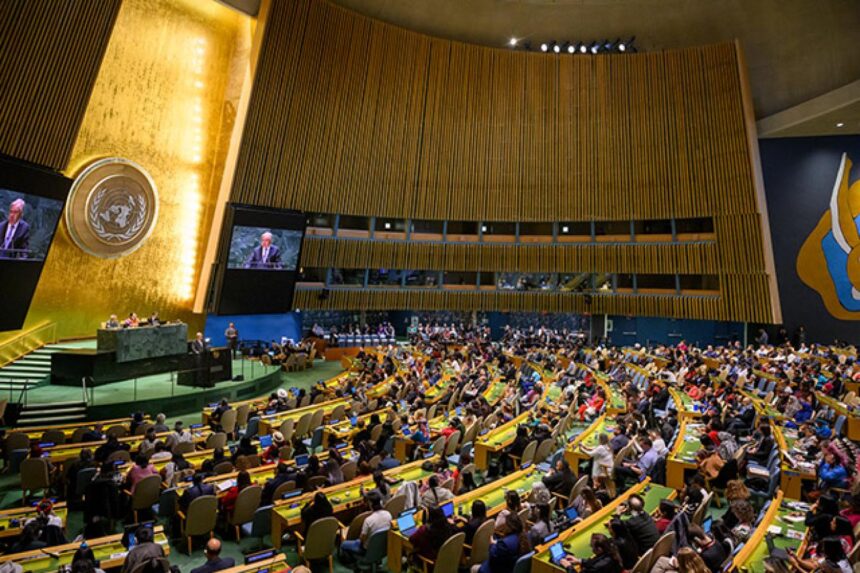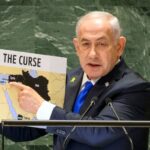As world leaders converge at the ongoing United Nations General Assembly (UNGA 80), African leaders, including Nigeria’s President Bola Tinubu, South Africa’s Cyril Ramaphosa, and Kenya’s William Ruto, have intensified their advocacy for a UN Security Council seat, framing it as a cornerstone of equitable global governance.
Under the session’s theme “Better together: 80 years and more for peace, development and human rights,” African leaders’ voices echo the continent’s demand to rectify what they described as historical injustices.
Many of the African leaders who have addressed the high-level debate have spotlighted the continent’s longstanding quest for a UN Security Council seat—the UN’s most powerful organ responsible for maintaining global peace.
With Africa comprising 54 nations and over 1.4 billion people, leaders argue that the body’s outdated postwar structure, dominated by five permanent members (P5: US, UK, France, Russia, China), undermines its legitimacy.
Leading the call on the day one of the UNGA 80 is South African President Cyril Ramaphosa who warned that the outdated structure of the Security Council and the persistent use of veto powers by permanent members are eroding the UN’s legitimacy and obstructing global peace efforts.
He stated: “These five permanent members effectively make decisions on behalf of more than 85% of the world’s population living in countries of the Global South.
“They continue to use their veto powers to effectively paralyze collective action and prevent timely responses to crises, even in the face of clear violations of international law.”
Ramaphosa argued that the imbalance within the UN Security Council seat undermined the UN’s neutrality and credibility.
He continued: “As we commemorate the 80th anniversary of the UN, the relevance of this institution and multilateral processes for the maintenance of international peace and security is being wilfully undermined.
“There is an increasing reliance on unilateral military action in contravention of international law.
“The United Nations Security Council has proven to be ineffective in its current form and composition in carrying out its Charter mandate to maintain international peace and security.
“South Africa remains deeply concerned by the erosion of the credibility of the Security Council and its failure to ensure accountability and uphold international law.”
Also, President Bola Tinubu, in a national address at the UNGA 80, demanded a UN Security Council seat.
Tinubu, who was represented by Vice President Kashim Shettima said: “I want to make four points today to outline how we can do this: One: Nigeria must have a permanent seat at the UN Security Council. This should take place as part of a wider process of institutional reform.
“Two: We need urgent action to promote sovereign debt relief and access to trade and financing. Three: Countries that host minerals must benefit from those minerals. Four: The digital divide must close.
“Nigeria’s journey tells this story with clarity: when the UN was founded, we were a colony of 20 million people, absent from the tables where decisions about our fate were taken; today, we are a sovereign nation of over 236 million, projected to be the third most populous country in the world, with one of the youngest and most dynamic populations on earth.
“A stabilising force in regional security and a consistent partner in global peacekeeping, our case for a permanent seat at the Security Council is a demand for fairness, for representation, and for reform that restores credibility to the very institution upon which the hope of multilateralism rests.”
Likewise, Kenyan President William Ruto asserted that Africa deserves two permanent seats on the UN Security Council with veto power, plus two non-permanent seats.
In his fiery address, Ruto asserted that the demand for a UN Security Council seat is “not a favour for Africa”, but a necessity for the organisation’s own survival.
He added: “Africa dominates most of the Security Council’s agenda… yet we remain the only continent without a permanent seat at the table, where decisions about our destiny are made. The world must understand that reforming the Security Council is not a favour to Africa; it is a necessity for the UN’s own survival.
“For two decades, Africa has spoken in one voice, demanding justice, equity, and representation in the highest organ of global governance.
“This demand, however, continues to be ignored, deferred, or endlessly debated to the detriment of both Africa and the legitimacy of the United Nations itself.
“You cannot claim to be the United Nations while disregarding the voice of 54 African countries, which is no longer willing to wait on the margins of global governance, while decisions about peace, security, and development are made without our understanding, perspectives, and voice. Africa’s exclusion is not only unacceptable, unfair, and grossly unjust; it also undermines the very credibility of the United Nations.”
Also, speaking on the issue, Liberian President Joseph Nyuma Boakai emphasized that Liberia’s historic term on the UN Security Council will be used to advocate for Africa’s rightful place at the table.
Boakai pointed out that while Africa shoulders a disproportionate share of the Security Council’s agenda, especially when it comes to peacekeeping, it remains the only continent without permanent representation. He called this a “historic injustice” that must end.
He stated: “While the nameplate during this two-year term will read ‘Liberia’, the seat, however, belongs to Africa. We are committed to ensuring that Liberia’s contributions to the Security Council’s discussions and decisions are shaped by our hard-earned experiences in conflict resolution, as well as our successes in peacebuilding, democratic reform, political transition, and governance.
“Additionally, the collective experiences of the continent will be taken into consideration. Liberia looks forward to advocating for Africa’s fair representation on the UN Security Council, which can only be achieved through permanent representation as a key part of the UN Security Council reform agenda.
“When the UN was founded in 1945, nations came together in the belief that peace could only be secured through cooperation. After two world wars, it became a widely held conviction that nations are stronger when united than when divided. Eighty years later, that conviction is being tested like never before. From wars and displacements to terrorism, threats to technological advances, climate change, and widening inequalities, today, our world faces challenges that no country can solve alone. At the same time, and paradoxically, when the world needs to strengthen multilateralism, its credibility and efficacy are being questioned.
“As one of only four African countries to sign the Charter of the United Nations, Liberia feels morally obligated to call for a renewal—rather than a reversal— of multilateralism. Reversal of multilateralism is not an option for a just and peaceful world. We call for greater inclusion, effectiveness, and respect for international law, recognizing that the credibility of the United Nations depends on our ability to act together in the service of humanity, rather than apart in the pursuit of narrow interests.”





